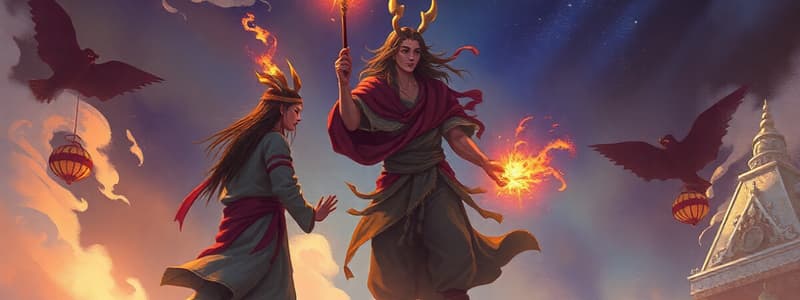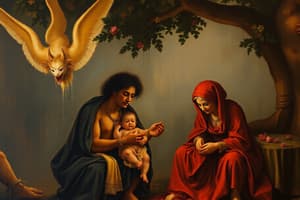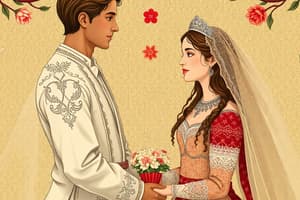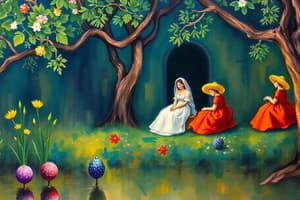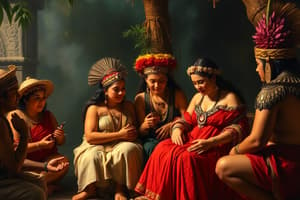Podcast
Questions and Answers
What best describes a ritual?
What best describes a ritual?
- A way of dressing for a formal event
- A set of activities performed in a fixed sequence and repeated periodically (correct)
- A process of learning a new culture
- A story that represents a culture's ideals
A custom is typically associated with a specific event.
A custom is typically associated with a specific event.
False (B)
Give an example of a ritual.
Give an example of a ritual.
Wedding
A __________ is a story with symbolic elements that represent a culture’s ideals.
A __________ is a story with symbolic elements that represent a culture’s ideals.
Match the following terms with their definitions:
Match the following terms with their definitions:
Which of the following represents sacred consumption?
Which of the following represents sacred consumption?
Profane consumption refers to objects treated with respect and awe.
Profane consumption refers to objects treated with respect and awe.
Describe enculturation.
Describe enculturation.
Flashcards
Ritual
Ritual
A set of actions performed in a specific order, often repeated on a regular basis. Examples include holiday traditions and rites of passage.
Custom
Custom
A way of doing something related to a specific event or independent of an event. A custom can be tied to consumption or specific objects.
Myth
Myth
A story with symbolic elements that reflects a culture's values and beliefs. They often explain origins or provide models for behavior.
Acculturation
Acculturation
Signup and view all the flashcards
Enculturation
Enculturation
Signup and view all the flashcards
Sacred Consumption
Sacred Consumption
Signup and view all the flashcards
Profane Consumption
Profane Consumption
Signup and view all the flashcards
Study Notes
Rituals
- Rituals are sets of activities performed in a fixed sequence and repeated periodically.
- Examples include holiday rituals, gift-giving rituals, and rites of passage (marking a social status change).
- Rituals can be utilitarian (practical) or symbolic.
- Rituals often involve consumption, as seen in weddings (ranging from a single event to month-long celebrations, e.g., Indian weddings).
Customs
- Customs are ways of doing something.
- Customs can be tied to an event (like a ritual), but can also be independent.
- An example is wearing a black tie for a formal dinner (not a ritual).
- Customs are often tied to consumption.
- The wearing of kimonos in Japan, a traditional Japanese garment, is a custom tied to consumption. Kimonos vary by season, event, age, and marital status.
Myths
- Myths are stories with symbolic elements representing a culture's ideals.
- Examples include Santa Claus, which is tied to Christmas consumption.
- Myths perform several functions:
- They explain the origins of existence (metaphysical).
- They show the universe is a single connected picture (cosmological).
- They maintain social order (sociological) by providing a social code.
- They model personal conduct (psychological).
Sacred and Profane Consumption
- Sacred consumption involves treating objects/events with respect and awe, often seen as set apart from daily normal activities (e.g., Mecca, Stonehenge).
- Profane consumption involves ordinary objects/events that are regularly consumed.
Studying That Suits You
Use AI to generate personalized quizzes and flashcards to suit your learning preferences.
